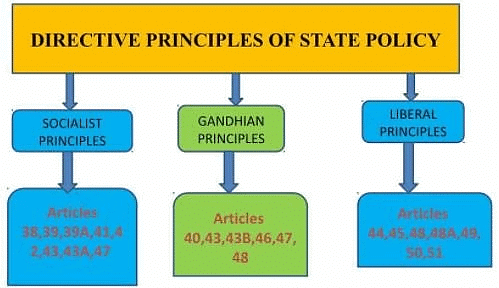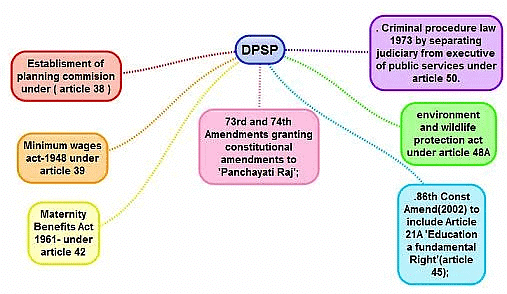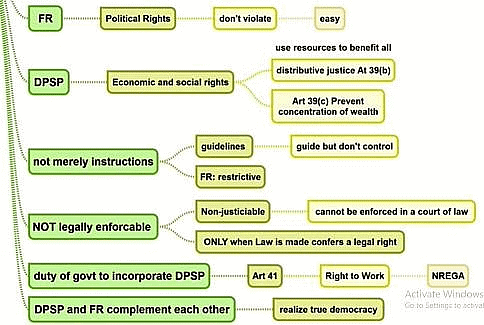Directive Principles Of State Policy | SSC CGL Tier 2 - Study Material, Online Tests, Previous Year PDF Download
Part IV (Arts. 36-51) of the Constitution contains the Directive Principles of State Policy. The principles reflect a unique mixture of humanitarian socialist precepts, Gandhian ideals and democratic socialism. Though not enforceable, they constitute the fundamental principles of Governance. Most of the Directives aim at the establishment of the economic and social democracy as pledged for in the Preamble. It shall be the duty of State to follow these principles both in the matter of administration as well as in making of laws.
Directive Principles
 Directive principles of state policy Art. 38: State to secure a social order for the promotion of welfare of the people. In particular, it is to minimise inequalities in income and endeavour to eliminate inequalities in status, facilities and opportunities.
Directive principles of state policy Art. 38: State to secure a social order for the promotion of welfare of the people. In particular, it is to minimise inequalities in income and endeavour to eliminate inequalities in status, facilities and opportunities.
Art. 39: Certain principles of policy to be followed by the State for securing adequate means of livelihood for all citizens, common good by distribution of ownership and control of the material resources of the community, an economic system that does not result in the concentration of wealth and means of production to the common detriment, equal pay for equal work for both men and women, health and strength of workers including children and opportunities and facilities for children to develop in a healthy manner and in conditions of freedom and dignity and be protected against exploitation.
Art. 39-A: Added by the 42nd Amendment, requires the State to secure equal justice and free legal aid.
Art. 40: Requires the State to take steps to organise village panchayats and endow them with such powers and authority as may be necessary to enable them to function as units of self-government.
Art. 41: Requires the State to make effective provision for securing the right to work, to education and to public assistance in cases of unemployment, old age, sickness and disablement, and in other cases of undeserved want.
Art. 42: Requires the State to make provision for securing just and humane conditions of work and for maternity relief.
Art. 43: Directs the State to secure, to all workers, agricultural , industrial or otherwise, work, a living wage, conditions of work ensuring a decent standard of life and full enjoyment of leisure and social and cultural opportunities and, in particular, to promote cottage industries on an individual or co-operative basis in rural areas.
 DPSP with some amendments
DPSP with some amendments
Art. 43-A: Added by 42nd Amendment, directs the State to take steps to secure the participation of workers in the management of undertakings, establishments or other organisations engaged in any industry.
Art. 44: Requires the State to secure for the citizens a uniform civil code throughout the territory of India.
Art. 45: Directs the State to provide, within a period of ten years from the commencement of this Constitution, for free and compulsory education for all children upto the age of fourteen years.
Art. 46: Requires the State to promote educational and economic interests of the weaker sections of the people, and, in particular, of the Scheduled Castes and the Scheduled Tribes, and protect them from social injustice and all forms of exploitation.
Art. 47: Directs the State to raise the level of nutrition and the standard of living and to improve public health, and, in particular, prohibit consumption except for medicinal purposes of intoxicating drinks and of drugs which are injurious to health.
Art. 48: Directs the State to organise agriculture and animal husbandry on modern and scientific lines and prohibit the slaughter of cows and calves and other milch and draught cattle.
Art. 48-A: Added by 42nd Amendment, directs the State to protect and improve the environment and to safeguard the forests and wild life of the country.
Art. 49: Directs the State to protect monuments and places and objects of national importance from spoliation, disfigurement, destruction, removal, disposal or export, as the case may be.
Art. 50: Directs the State to take steps for separation of judiciary from executive.
Art. 51: Directs the State to
(i) Promote international peace and security.
(ii) Maintain just and honourable relations between nations.
(iii) Foster respect for international law and treaty obligations in the dealings of organised people with one another and
(iv) Encourage settlement of international disputes by arbitration.
Classification of Directive Principles
Directive principles may be classified into various group.
- Social and Economic Justice
(i) Social order based on justice: Art. 38 (1) and 38 (2) require the State to maintain a social order based on justice.
(ii) Distributive justice: Distributive justice is the common aim of Art. 38. and 39. They propose to promote equality in wider perspective and create circumstances to avoid injustice at the social and economic levels. - Ideals of Social Security
(i) Right to work, to education and public assistance in certain cases (Art. 41) Recently, the Supreme Court declared, in Mohini Jain's case, that the right to education be equated with a fundamental right and it should be read with Art. 22. This is because the right to life means a dignified life, which has no meaning without education.
(ii) Free and compulsory education for children up to 14 years (Art. 45).
(iii) Promotion of educational and economic interests of the weaker sections (Art. 46).
(iv) Raising the standard of living and improvement of health (Art. 47).
(v) Equal justice and free legal aid (Art. 39A).
(vi) Just and human conditions of work (Art. 42).
(vii) Living wage etc. for workers (Art. 43) and
(viii) Participation of workers in the management of industries (Art. 42A) - Community Welfare Ideals
(i) Uniform civil code (Art. 44)
(ii) Organisation of agriculture and animal husbandry (Art. 48)
(iii) Protection and improvement of forests and animal life (Art. 48A)
(iv) Protection of monuments and places and objects of national importance (Art. 49)
(v) Separation of judiciary from the executive (Art. 50)
(vi) Promotion of international peace and security (Art. 51)
(vii) Organisation of village panchayats (Art. 40)
Significance of Directive Principles
Directive Principles even though are not enforceable in the courts of law, Art. 37 unequivocally enjoins that "it shall be the duty of the State to apply these principles in making laws. Owing to the legal deficiencies of the Directives the utility of their incorporation in the Constitution, which is a legal instrument has been questioned. Directives were intended as moral precepts for the authorities of the State. Directives emphasise, in amplification of the Preamble, that the goal of the Indian polity is a welfare state. Also the Court should keep in mind the Directive Principles while interpretation of statutes.
Implementation of Directive Principles
Though implementation has been far from satisfactory, the State is showing a genuine will to implement the directive principles. In electoral politics, no government may, with impunity, ignore welfare oriented policies with regard to public health, education, economic equality, position of women, children and backward classes in the planning process.
The following are some areas where directive principles have shown some impact.
(i) Art. 39: A series of Acts have been passed from time to time such as Employees State Insurance Act, Minimum Wages Act, Wealth Tax Act, Estate Duty Act and so on. Legislatures of almost all the states and Union Territories passed Land Reform Acts which fixed ceilings on land holdings and the surplus land acquired from land owners was distributed among the landless workers. The Legislatures of almost all the states and Union Territories passed Acts for the abolition of intermediaries like zamindars, jagirs and more than three crores of farmers became the owners of land.
(ii) Art. 40: A large number of laws have been enacted to organise village panchayats and endow them powers of self-government.
(iii) Art. 43: For the promotion of cottage industries which is a state subject, the Central Government has established several Boards to help the State governments, in the matter of Finance, Marketing and the like.
(iv) Art. 44: The enactment of the Hindu Marriage Act (1955) and the Hindu Succession Act (1956) have been important steps to implement the directives of uniform civil code.
 DPSP- Characteristics, origin, and nature
DPSP- Characteristics, origin, and nature
(v) Art. 45: Legislation for compulsory primary education exists in many states.
(vi) Art. 46: Various programmes to educate the tribal youth and promote the welfare of scheduled tribes and scheduled castes have been taken up.
The Mandal Commission has been declared constitutional. The state has provided reservation in government jobs to the socially and educationally backward (SEB).
(vii) Art. 47: For raising the standard of living, particularly of the rural population, the Government of India launched its Community Development Project in 1952. The Department of Women and Children Development continued its programmes in the areas of women's development as well as of the child development
|
1650 videos|1642 docs|920 tests
|





















